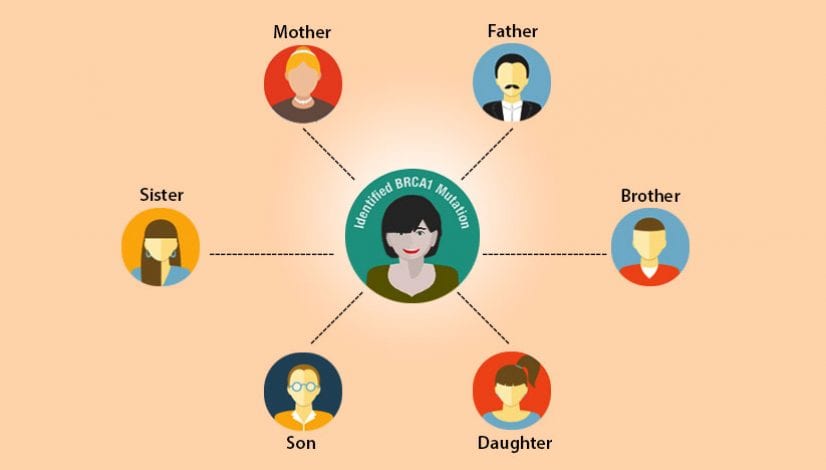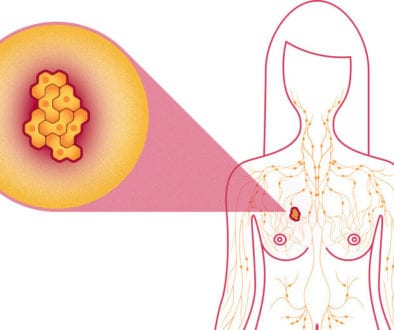Patient Story: Brave it up with BRCA
Patient Story related to BRCA testing:
Zara*, 49, comes from a family that has been affected greatly by breast cancer. All her life Zara* was aware of breast cancer, even before she herself was diagnosed with it. Her mother had been diagnosed with breast cancer and passed away from the disease at the age of 42. Slowly her family history of cancer unfolded. Zara’s paternal aunts daughter, has been diagnosed with breast cancer. While her maternal uncle has recently been diagnosed with pancreatic cancer.
She herself was diagnosed with HER-2 positive breast cancer which is a breast cancer that tests positive for a protein called human epidermal growth factor receptor 2 (HER2), which promotes the growth of cancer cells. In about 1 of every 5 breast cancers, the cancer cells have a gene mutation that makes an excess of the HER2 protein.
In a healthy breast cell, HER2 is responsible for repairing the cell and growing more cells. If the HER2 gene is mutated, it causes an abnormal increase in the amount of HER2 proteins on the surface of the cells. This causes cells to grow and divide out of control, which may lead to cancer. HER2-positive breast cancer is not inherited. Instead, it’s considered a somatic genetic mutation.
HER2-positive breast cancers tend to be more aggressive than other types of breast cancer. They’re less likely to be sensitive to hormone therapy, though many people with HER2-positive breast cancer can still benefit from hormone therapy. Zara was getting treated with Trastuzumab, a monoclonal antibody which binds to the extracellular domain of the HER2 receptor and that prevent the activation of its intracellular tyrosine kinase (sold under the brand name Herceptin). Treatments that specifically target HER2 are very effective. These treatments are so effective that the prognosis for HER2-positive breast cancer is actually quite good.
Zara was absolutely terrified, but also excited to beat her odds with new modern medicine and surgery. Beside getting treated with drugs later she also had preventive right breast mastectomy and oophrectomy.
Like the HER2 gene, BRCA genes are designed to repair DNA damage in cell and help restore normal, in healthy breast cells. In some people, however, these genes stop performing properly due to mutations within them. These abnormal gene mutations can be passed from generation to generation. Having a mother, grandmother, sister, or aunt with breast cancer or ovarian cancer before age 50, increases your likelihood of having a mutated gene as well.
Zara always knew that her family had either been dealt with a really bad set of cards or had a hereditary genetic mutation due to their strong history. She began to look into learning more about her risk. Thus, she asked her doctors about genetic testing. She spoke with a doctor about her paternal and maternal family cancer history and she was encouraged to find out about the BRCA status in order to take informed decision with respect to her therapy.
Genetic counsellor looking at her family’s breast cancer history and immediately recommended Myriad BRACAnalysis in pre-test genetic counselling.
Recommendations:
- Zara reported positive for a deleterious BRCA1 gene mutation by Myriad BRACAnalysis. Which renders 20% risk for secondary cancer. Without a BRCA1 or BRCA2 mutation, the risk of developing a new breast cancer after one episode of breast cancer is only 1% per year.
- Also, because of the germline mutation being positive she is now an eligible candidate for PARP inhibitors as a FDA approved drug to treat advanced breast cancer in people with a BRCA1 or BRCA2 mutation. Post testing, genetic counsellor on account of her positive BRCA mutation status and cancer history advised hereditary cancer test for her siblings as well.
- Her younger brother was also reported positive for the same deleterious BRCA1 gene mutation. He is now at elevated risk of pancreatic cancer and prostate cancer. So, active surveillance is recommended for him while her sister was reported negative.
HER2-amplified breast cancers are rare amongst BRCA1 mutation. However, as seen in this case with early detection, the vast majority of people survive breast cancer and go on to live full, normal lives.
This case study explains, how with advances in our understanding of breast cancer and genetic testing, we know much more about women’s individual risk of developing breast cancer. And better estimates of a breast cancer patient’s risk which provides us with an opportunity to see if we can do better, and improve detection rates for secondary cancer while reducing the number of unnecessary breast biopsies.
References:
https://www.healthline.com/health/her2-positive-breast-cancer-genes-hereditary#her
https://www.breastcancer.org/symptoms/testing/genetic/pos_results
https://www.ncbi.nlm.nih.gov/pubmed/26888723
https://www.nationalbreastcancer.org/what-to-do-if-youve-tested-positive
*name changed to protect patient privacy
By: Fatma Islahi




